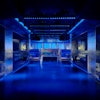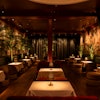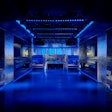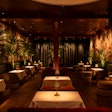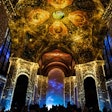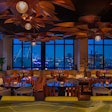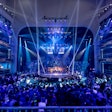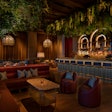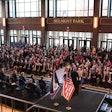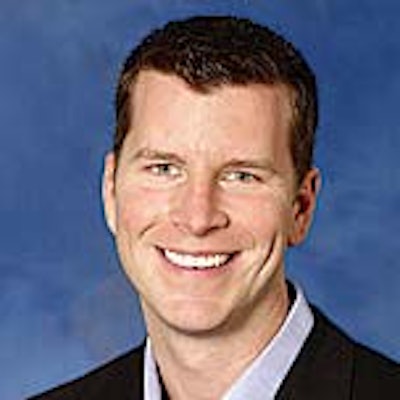
Title: Senior Director of Production and Process Management, National Academy of Recording Arts and Sciences
What he plans: All academy events, from small annual meetings to the Grammy telecast and post-party for about 5,000 guests.
Staff: Six full-time employees, plus additional temporary staffing as necessary. For big events, the number soars into the hundreds, including 30 to 50 vendors and their staff.
Budget: More than $2.5 million a year for special events (not including telecasts)
Career path: Graduated from the University of Southern California with a degree in entrepreneurship and marketing. From there, he did management consulting,mostly for entertainment clients, followed by television production. He moved to the academy in 2001.
Age: 31
Favorite venue: The Fairmont Kea Lani in Maui for smaller events; the Sheraton New York Hotel and Towers and the Millennium Biltmore in Los Angeles for larger events.
Favorite hors d'oeuvres: "Anything that's tasty and stunningly presented."
Favorite magazine: Architectural Digest
Where he grew up: Colorado
Where he lives: Hollywood Hills
How is it different to plan the Grammy events in New York versus Los Angeles?
When we do a major event or production outside of L.A., we have to make a difficult decision about staffing. Do we fly our staff out and set up our operations, or do we hire temporary staffing and recreate an entire office? Another challenge in New York is the weather. The Grammys are in early February and last year there was a terrible blizzard. Luckily the timing worked out well, because most of our staff was already in-house and the trucks were already loaded.
How do you keep the events fresh?
When we choose our partners, we choose carefully to make sure that we're working with some of the industry's top innovators and leaders who constantly have fresh ideas. We rely on our partners to keep it fresh.
With many of the record labels hosting their own parties after the Grammys, how do you put together a post-party that makes people want to stay?
Ours will always be the official post-party because it is the only one endorsed by the academy. And because of these economic times, many of the record labels' parties are getting smaller, but ours isn't. Our attrition has actually gone down. We're also able to keep our guests because we offer lots of choices within our
venues. When you tire of one room, you simply have to walk across the hall, where there will be another room with a different set of celebrity chefs, different music and a different vibe.
Will the Grammys return to New York?
For 2004, we will be in L.A. again. We haven't made the final decision for 2005 yet, but because we had such great success in New York last year, we may return. We were thrilled with the way the city rolled out the red carpet for us.
How has the economy affected your events this year?
My budgets haven't fluctuated significantly, but what has changed are my allocations within those budgets. Security clearly became a big concern after September 11 and we have to put much more money into it, which means sacrificing a little of our design and d?cor or high-end food.
Where do you find new vendors?
In this business, it is much easier to continue a relationship than to find a new vendor, because people who haven't experienced our events may not understand our dynamic at the academy.
What do today's guests expect at an event?
Guests are looking to be awestruck when they first walk in and if they don't have a centerpiece on which to focus-first-rate talent or a design element-they won't get that initial awestruck feeling. The flow of the event is the next-most important thing. When businesses buy tickets these days, they are not only doing it because it's a fun perk for the staff, they're doing it because it's a business opportunity. People want to be able to network, so we've been creating environments where they can do that. For example, our pre-receptions are expanding, whereas the sit-down dinner is getting a little shorter.
What trends are you seeing in event style?
The industry had gotten casual for a long time and people are going back to a more formal style. The minimalist look has been done and people are returning to opulence. Nonetheless, events still need to have the elements that make people feel comfortable. Nobody wants to walk into a room and be overwhelmed by the design or the florals.
How has technology affected the way you plan events?
We used to focus on how we were going to create an event based on rentals and large props, and that has really changed. Floor space is important because you need room for bars, food stations and guests. Because of technological advances, we can preserve that space by relying on the walls, projection units and lighting instead of props. Technology has allowed us to do other exciting things too. This year we produced a 50-foot water wall at the Grammys post-party where we projected different images, including footage from that evening's telecast. There was even a lounge within the water wall.
—Alesandra Dubin
Posted 02.04.04
This Q&A originally appeared in our newspaper, the BiZBash Event Style Reporter.
What he plans: All academy events, from small annual meetings to the Grammy telecast and post-party for about 5,000 guests.
Staff: Six full-time employees, plus additional temporary staffing as necessary. For big events, the number soars into the hundreds, including 30 to 50 vendors and their staff.
Budget: More than $2.5 million a year for special events (not including telecasts)
Career path: Graduated from the University of Southern California with a degree in entrepreneurship and marketing. From there, he did management consulting,mostly for entertainment clients, followed by television production. He moved to the academy in 2001.
Age: 31
Favorite venue: The Fairmont Kea Lani in Maui for smaller events; the Sheraton New York Hotel and Towers and the Millennium Biltmore in Los Angeles for larger events.
Favorite hors d'oeuvres: "Anything that's tasty and stunningly presented."
Favorite magazine: Architectural Digest
Where he grew up: Colorado
Where he lives: Hollywood Hills
How is it different to plan the Grammy events in New York versus Los Angeles?
When we do a major event or production outside of L.A., we have to make a difficult decision about staffing. Do we fly our staff out and set up our operations, or do we hire temporary staffing and recreate an entire office? Another challenge in New York is the weather. The Grammys are in early February and last year there was a terrible blizzard. Luckily the timing worked out well, because most of our staff was already in-house and the trucks were already loaded.
How do you keep the events fresh?
When we choose our partners, we choose carefully to make sure that we're working with some of the industry's top innovators and leaders who constantly have fresh ideas. We rely on our partners to keep it fresh.
With many of the record labels hosting their own parties after the Grammys, how do you put together a post-party that makes people want to stay?
Ours will always be the official post-party because it is the only one endorsed by the academy. And because of these economic times, many of the record labels' parties are getting smaller, but ours isn't. Our attrition has actually gone down. We're also able to keep our guests because we offer lots of choices within our
venues. When you tire of one room, you simply have to walk across the hall, where there will be another room with a different set of celebrity chefs, different music and a different vibe.
Will the Grammys return to New York?
For 2004, we will be in L.A. again. We haven't made the final decision for 2005 yet, but because we had such great success in New York last year, we may return. We were thrilled with the way the city rolled out the red carpet for us.
How has the economy affected your events this year?
My budgets haven't fluctuated significantly, but what has changed are my allocations within those budgets. Security clearly became a big concern after September 11 and we have to put much more money into it, which means sacrificing a little of our design and d?cor or high-end food.
Where do you find new vendors?
In this business, it is much easier to continue a relationship than to find a new vendor, because people who haven't experienced our events may not understand our dynamic at the academy.
What do today's guests expect at an event?
Guests are looking to be awestruck when they first walk in and if they don't have a centerpiece on which to focus-first-rate talent or a design element-they won't get that initial awestruck feeling. The flow of the event is the next-most important thing. When businesses buy tickets these days, they are not only doing it because it's a fun perk for the staff, they're doing it because it's a business opportunity. People want to be able to network, so we've been creating environments where they can do that. For example, our pre-receptions are expanding, whereas the sit-down dinner is getting a little shorter.
What trends are you seeing in event style?
The industry had gotten casual for a long time and people are going back to a more formal style. The minimalist look has been done and people are returning to opulence. Nonetheless, events still need to have the elements that make people feel comfortable. Nobody wants to walk into a room and be overwhelmed by the design or the florals.
How has technology affected the way you plan events?
We used to focus on how we were going to create an event based on rentals and large props, and that has really changed. Floor space is important because you need room for bars, food stations and guests. Because of technological advances, we can preserve that space by relying on the walls, projection units and lighting instead of props. Technology has allowed us to do other exciting things too. This year we produced a 50-foot water wall at the Grammys post-party where we projected different images, including footage from that evening's telecast. There was even a lounge within the water wall.
—Alesandra Dubin
Posted 02.04.04
This Q&A originally appeared in our newspaper, the BiZBash Event Style Reporter.

